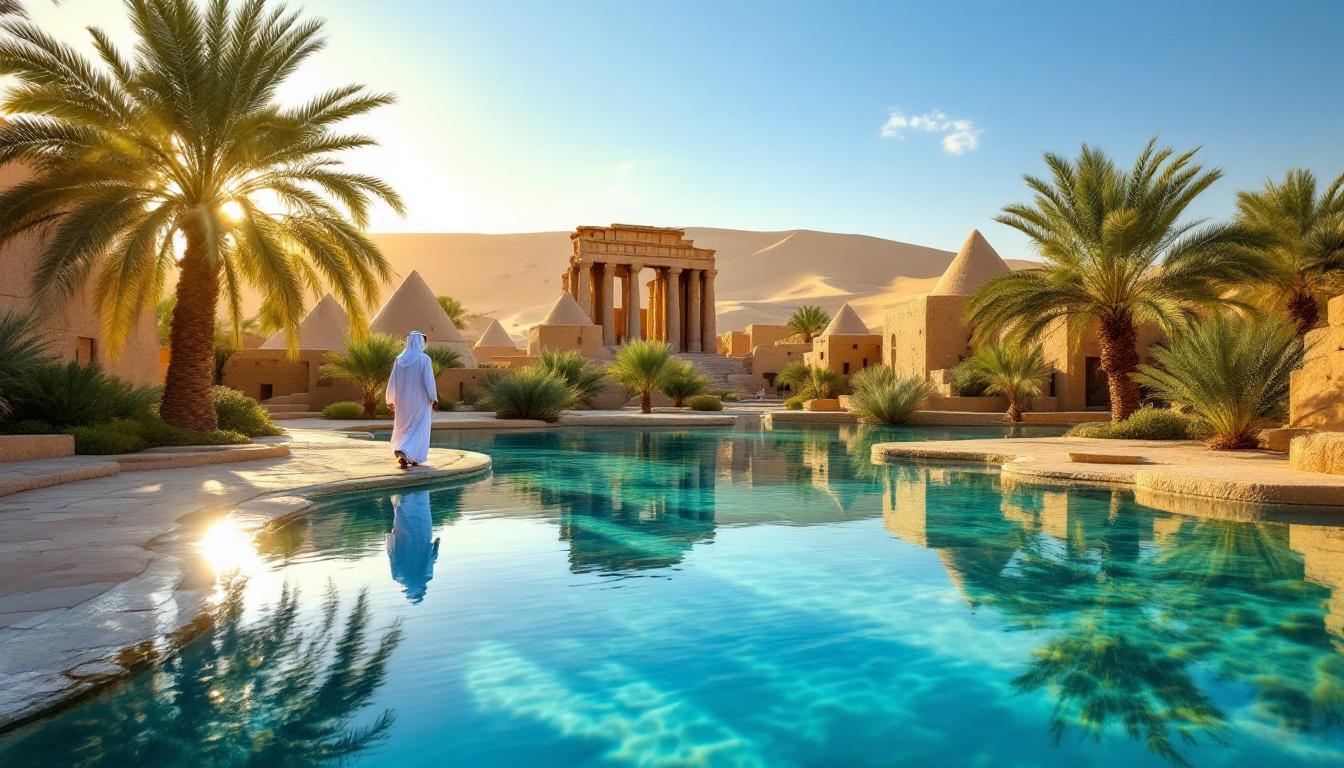Deep in Egypt’s Western Desert, where the Sahara stretches endlessly toward Libya, lies a secret that has survived 3,000 years of history. Siwa Oasis remains hidden 780 kilometers from Cairo, protected by harsh desert roads that filter out casual tourists.
This isn’t another overcrowded Egyptian destination. While 15.78 million tourists flooded Egypt’s famous sites in 2024, Siwa’s 33,000 Berber guardians have quietly preserved their ancient paradise. No airport exists here by design, ensuring only determined travelers reach this sacred sanctuary.
The locals call it *Isiwan* in their ancient Siwi language, one of the last spoken Berber dialects in Egypt. What they guard here defies belief: 300+ natural springs, the Oracle Temple where Alexander the Great was declared divine, and therapeutic salt lakes that heal both body and spirit.
The ancient mysteries locals still protect
Oracle secrets buried in desert sands
The Temple of Amun stands where history’s greatest conqueror sought divine confirmation in 331 BC. Alexander’s pilgrimage here changed the ancient world, yet most tourists race past toward Luxor’s crowds. Local Berber families still whisper stories passed down through 100 generations about sacred rituals performed in these ruins.
Springs with names only Siwans know
While tour groups splash in commercialized pools elsewhere, Siwa’s locals guard 300+ therapeutic springs with Siwi names like *Ain Juba* and *Bir Wahed*. These aren’t Instagram props—they’re living cultural sites where families have gathered for millennia. The sulfurous waters cure skin diseases and respiratory ailments that desert air naturally heals.
Why reaching Siwa requires real commitment
The deliberate isolation that preserves paradise
No direct flights exist to Siwa, and locals prefer it that way. The 10-hour desert drive from Cairo or Alexandria serves as natural selection—only travelers serious about authentic cultural immersion make the journey. This remoteness has protected Berber traditions that commercialized oases lost decades ago.
Infrastructure limitations that filter crowds
Local community leaders deliberately limit rapid development, maintaining traditional mud-brick architecture alongside minimal modern amenities. While Red Sea resorts accommodate millions, Siwa’s small family-run guesthouses offer intimate experiences where visitors learn pottery, embroidery, and jewelry-making directly from Berber artisans.
The authentic Berber culture tourists rarely witness
Living traditions in a commercialized world
Unlike Morocco’s tourist-focused Berber experiences, Siwa’s culture remains genuinely functional. Siwi language fills daily conversations, traditional date and olive harvests follow ancient rhythms, and community decisions happen in circles that predate Islam. Visitors witness real Berber life, not performances.
Sacred festivals hidden from guidebooks
The *Siyaha Festival* celebrates the date harvest each October with traditional dancing, poetry, and communal feasting that welcomes respectful outsiders. Local families share authentic cuisine like *fateer* bread and fresh dates while teaching sustainable desert agriculture techniques their ancestors developed. These aren’t tourist shows—they’re living cultural continuity.
Natural wonders that rival famous destinations
Desert springs superior to coastal resorts
While Egypt’s Mediterranean and Red Sea coasts swelter with 45°C summers and humidity, Siwa’s dry desert climate offers therapeutic relief. Natural spring pools maintain perfect swimming temperatures year-round, surrounded by date palms that create natural shade unavailable at crowded beach resorts.
Wildlife sanctuary hiding endangered species
The Great Sand Sea surrounding Siwa protects fennec foxes, sand cats, and rare desert birds that disappeared from accessible areas. Local guides, many descended from ancient desert nomads, share wildlife tracking knowledge while maintaining protective silence about breeding locations.
Siwa Oasis proves that Egypt’s greatest treasures remain hidden from mass tourism. The 33,000 Berber guardians who call this paradise home have successfully balanced cultural preservation with selective sharing, creating experiences that transform rather than entertain.
Their secret isn’t just geographical—it’s philosophical. They understand that true cultural exchange requires respect, time, and genuine interest in learning rather than consuming. Visit Siwa not to conquer another destination, but to witness how ancient communities can thrive while sharing their wisdom with the wider world.
